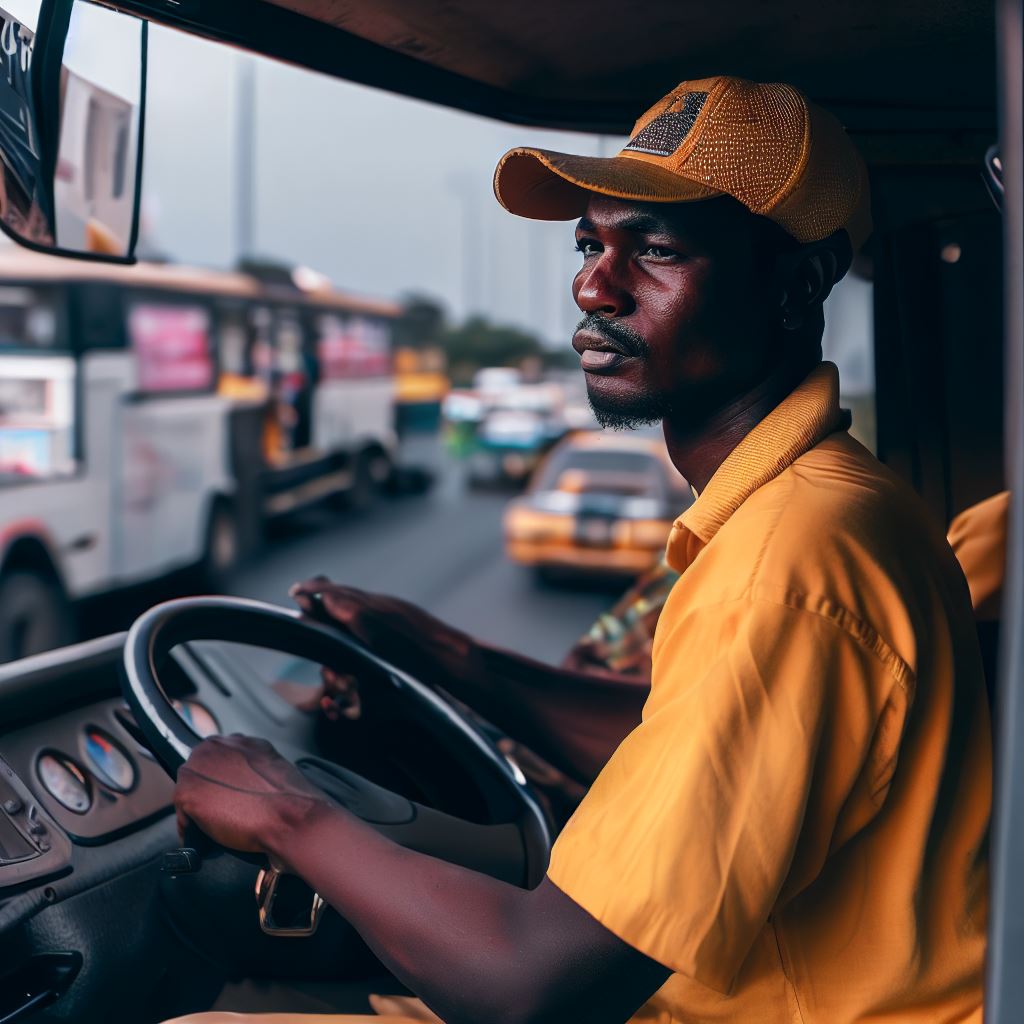Surviving Traffic: A Nigerian Bus Driver’s Daily Battle
Last Updated on January 26, 2024
Introduction
Nigerian Bus Driver Surviving Traffic is a saga that unfolds each day at dawn, as these unsung heroes embark on their grueling journey.
From bustling urban streets to winding rural roads, they face an unyielding barrage of challenges, navigating through the labyrinthine traffic of Nigeria.
Traffic congestion, often unforgiving, transforms their daily commute into a perilous adventure.
With unpredictable pedestrians and reckless motorcyclists adding to the chaos, these drivers persevere, showcasing their indomitable spirit.
They expertly maneuver through the ever-changing traffic landscape, a testament to their unwavering determination.
In this section, we delve deep into the triumphs and tribulations of these resilient bus drivers, shedding light on their extraordinary journey through Nigeria’s traffic.
Overview of Nigerian Traffic
A. Statistics and facts about traffic in Nigeria
- Nigeria has some of the worst traffic congestion in the world.
- Lagos, the country’s largest city, is notorious for heavy traffic.
- In Lagos alone, the average commuting time is over four hours each day.
- According to a study, traffic congestion costs Nigeria an estimated $1 billion annually.
B. Challenges faced by commuters and drivers
- Commuters endure long hours spent in crowded buses and constant traffic standstills.
- Drivers face aggressive behavior from other drivers, road accidents, and frequent breakdowns.
- Urban planning issues, insufficient road infrastructure, and poor traffic management contribute to the problem.
- Excessive population growth and a lack of alternative transportation options worsen the traffic situation.
C. The importance of public transportation, especially buses
- Public transportation, particularly buses, plays a crucial role in reducing traffic congestion.
- Buses can accommodate a large number of passengers, reducing the number of individual cars on the road.
- When more people use public transportation, it leads to a decrease in traffic volume and improved flow.
- Buses are a more sustainable and cost-effective mode of transportation compared to private vehicles.
- Efficient public transportation systems also contribute to economic growth and reduced carbon emissions.
Navigating Nigerian traffic poses immense challenges for both commuters and drivers alike.
The statistics lay bare the gravity of the situation, with Nigeria’s traffic congestion ranking among the worst globally.
Commuters endure grueling hours in packed buses, often stuck in seemingly endless standstills.
Meanwhile, drivers contend with aggressive behavior, frequent accidents, and vehicle breakdowns.
The problem’s severity is exacerbated by inadequate road infrastructure, urban planning shortcomings, and rapid population growth.
In this vehicular chaos, the unsung heroes are the Nigerian bus drivers, exemplifying resilience as they navigate through the relentless traffic.
Public transportation, particularly buses, emerges as a potential remedy.
Buses can accommodate scores of passengers, reducing the number of individual cars clogging the roads.
Widespread bus usage promises diminished traffic volume and smoother traffic flow. Moreover, public transportation is a more sustainable and cost-effective alternative to private vehicles.
An efficient public transportation system not only eases traffic congestion but also fosters economic growth and curtails carbon emissions.
Despite the daily trials faced by Nigerian bus drivers, public transportation remains a lifeline amidst the relentless traffic challenges.
By prioritizing buses and enhancing public transportation infrastructure, Nigeria can take substantial strides toward alleviating traffic woes and enhancing the overall quality of life for its citizens.
In the midst of the gridlock, Nigerian bus driver surviving traffic serves as a testament to the resilience and determination of those who keep the nation moving.
The Life of a Nigerian Bus Driver
A. Description of the daily routine and responsibilities of a bus driver
Surviving the chaos of Nigerian traffic is no small feat for bus drivers. Each day, they rise with the sun, gearing up for the relentless hours ahead.
Mental and physical preparation are key as they confront the challenges of the road.
In this section, we’ll delve into the world of “Nigerian Bus Driver Surviving Traffic,” shedding light on the resilience and determination required for this demanding job.
With a cup of strong coffee in hand and a quick breakfast, they head out to their designated bus station.
Upon arrival at the bus station, these drivers inspect their vehicles to ensure they are in proper working condition.
Checking the engine, lights, and brakes is crucial for the safety of the passengers they will transport throughout the day.
Once the bus is ready, they meticulously plan their route, taking into consideration the congested roads and ongoing construction work.
Nigerian bus drivers need to be knowledgeable about alternative routes and shortcuts to avoid prolonged delays.
As passengers start to arrive, bus drivers patiently greet them with a smile and help them find a seat.
It is their responsibility to ensure everyone is comfortable and safe during the journey.
They collect the fare, providing change if needed, and politely answer any queries passengers may have.
B. The difficulties encountered by bus drivers in navigating through traffic
Surviving the chaotic traffic in Nigeria poses the ultimate challenge for bus drivers.
The congested roads, unruly drivers, and the absence of effective traffic regulations create an arduous environment.
The sheer volume of vehicles overwhelms them, forcing constant acrobatics through tight spaces, weaving between motorcycles, cars, and pedestrians all vying for a slice of the road.
Patience and top-notch driving skills are indispensable for safe navigation.
Yet, another formidable hurdle is the lack of proper infrastructure. Potholes, malfunctioning traffic lights, and poorly designed intersections compound their woes.
Amidst all this, they strive to ensure a safe and smooth ride for their passengers. Nigerian Bus Drivers: Masters of Surviving Traffic.
C. The impact of traffic on the physical and mental health of bus drivers
The constant battle with traffic takes a toll on the physical and mental health of Nigerian bus drivers.
Long hours spent behind the wheel under stressful conditions can lead to various health issues.
Physically, the sedentary nature of their job contributes to problems such as obesity, back pain, and cardiovascular diseases.
Bus drivers often don’t have time for regular exercise or breaks, exacerbating these health risks.
Mentally, the daily exposure to traffic-induced stress can lead to anxiety, frustration, and overall mental fatigue.
Dealing with impatient passengers, incessant honking, and aggressive drivers can leave bus drivers emotionally drained.
Moreover, the polluted air in traffic-congested areas adds further health risks. Inhaling harmful exhaust fumes on a daily basis can lead to respiratory issues and increase the chances of developing chronic diseases.
In short, the life of a Nigerian bus driver is a challenging one.
From their daily routine and responsibilities to the difficulties encountered while navigating through traffic, these drivers face numerous obstacles.
The impact of traffic on their physical and mental health cannot be underestimated.
Despite these challenges, the resilience and dedication of Nigerian bus drivers play a crucial role in ensuring the transportation needs of their fellow countrymen are met.
Read: Eco-Friendly Bus Travel: A New Trend in Nigeria?

Strategies for Survival
A. Different techniques employed by Nigerian bus drivers to navigate through traffic
- Nigerian bus drivers utilize lane splitting to maneuver through congested roads.
- They also rely on honking as a means of communication and warning to other drivers.
- Bus drivers in Nigeria skillfully use their mirrors to keep track of surrounding vehicles.
- They employ defensive driving techniques such as leaving enough space between vehicles.
- Bus drivers use hand gestures to indicate their intentions or direct other drivers.
- They often take alternative routes or use unmarked paths to avoid heavy traffic.
- Nigerian bus drivers expertly navigate through narrow gaps and tight spaces in traffic.
- They take advantage of the knowledge of shortcuts and hidden routes to save time.
- Bus drivers also make quick decisions and adapt their strategies to changing traffic conditions.
- They constantly assess and anticipate the behavior of other drivers for safer navigation.
B. Role of experience and familiarity with the routes in traffic management
In the realm of efficient traffic management, a wealth of experience navigating routes is paramount.
This principle holds true across the globe, as exemplified by the Nigerian Bus Driver Surviving Traffic.
- Experienced bus drivers in Nigeria develop an understanding of traffic patterns and congestion hotspots.
- They know the best times to travel on certain routes for minimal traffic delays.
- Familiarity with routes allows drivers to use alternative roads to avoid congested areas.
- Experienced drivers can predict potential traffic bottlenecks and plan their approach accordingly.
- Knowing the locations of police checkpoints and common traffic enforcement areas helps drivers prepare.
- Familiarity with road conditions enables drivers to adjust their driving style for maximum safety.
- Experience allows bus drivers to handle unexpected situations with more confidence and composure.
- Experienced bus drivers often possess a network of fellow drivers who share real-time traffic updates.
- Knowing the routes well reduces the likelihood of getting lost or taking wrong turns.
- Experience and familiarity contribute to efficient and smooth traffic flow throughout the city.
C. The importance of patience, resilience, and adaptability for bus drivers
Patience, resilience, and adaptability are vital qualities for Nigerian bus drivers:
- Patience helps drivers remain calm and composed in frustrating and stressful traffic situations.
- Resilience allows drivers to bounce back from setbacks like unexpected road closures or accidents.
- Adaptability enables drivers to quickly adjust their strategies based on changing traffic conditions.
- Patience is needed to cope with unruly passengers and challenging interactions on the road.
- Resilient drivers can overcome the mental and physical fatigue associated with long hours on the road.
- Adaptable drivers can find alternative solutions when faced with roadblocks or detours.
- Patience helps drivers maintain a safe following distance and avoid aggressive driving behaviors.
- Resilience allows drivers to stay focused and continue providing transportation services despite challenges.
- Adaptability ensures that drivers can navigate through unexpected road conditions or traffic incidents.
- Patience, resilience, and adaptability contribute to the overall safety and efficiency of bus operations.
Read: Rural to Urban Transit: Opportunities in Nigerian Buses
Delve into the Subject: The Role of Solar PV Installers in Nigeria’s Grid
Safety Concerns and Risks
A. Safety hazards faced by bus drivers in Nigerian traffic
- Poor road conditions with potholes and uneven surfaces.
- Congested traffic leading to potential accidents and delays.
- Reckless driving by other motorists, including speeding and dangerous overtaking.
- Public transportation vehicles often being overloaded with passengers, compromising safety.
- Lack of enforcement of traffic rules and regulations by authorities.
B. Measures taken by bus drivers to ensure the safety of their passengers
- Defensive driving techniques, such as maintaining a safe distance from vehicles and anticipating potential hazards.
- Constant vigilance and awareness of the surroundings to react promptly to any unexpected situation.
- Regular vehicle maintenance, including brakes, tires, and lights, to ensure optimal performance.
- Clear communication with passengers, providing instructions and warnings to maintain order and safety.
- Encouraging passengers to use seat belts, when available, as an added safety precaution.
C. Potential consequences of reckless driving and aggressive behavior
- Increased risk of accidents and injuries to both passengers and other road users.
- Damage to vehicles and property, resulting in financial burdens for bus drivers.
- Legal consequences, such as fines, suspension of driving licenses, or imprisonment.
- Reputation damage for the transportation company, leading to loss of trust and customers.
- Emotional and psychological toll on bus drivers due to the potential guilt and trauma from accidents.
In bustling Nigerian cities, the life of a bus driver is a daily gamble with safety.
The challenges they face on the road are as diverse as the vibrant culture that surrounds them.
From poorly maintained roads to streets congested with unruly drivers, the hazards are numerous. Overloading, too, is a common occurrence that adds to the risks.
Yet, amidst this chaos, Nigerian bus drivers are not just passengers’ chauffeurs; they are their guardians.
They employ defensive driving techniques and prioritize vehicle maintenance to ensure a safe journey.
Reckless driving and aggressive behaviors can lead to devastating consequences, including accidents, injuries, legal entanglements, and damage to their reputation.
Addressing these safety concerns is not just a necessity; it’s a lifeline for Nigerian bus drivers and their passengers alike. “Nigerian Bus Driver Surviving Traffic” is a testament to their resilience.
Read: The Influence of Social Media on Event Planning in Nigeria
Coping Mechanisms and Support
A. Coping Mechanisms of Bus Drivers in Dealing with Traffic
- Developing a positive mindset to stay motivated and focused throughout the day.
- Finding solace in music or comedy to alleviate stress during long hours of traffic congestion.
- Engaging in deep-breathing exercises and mindfulness techniques before and after each journey.
- Sharing experiences and strategies with fellow bus drivers, creating a support network to reduce stress.
- Taking breaks in between shifts to rest, recharge, and release tension built up during traffic encounters.
- Practicing defensive driving techniques to ensure safety and minimize accidents on chaotic roads.
- Maintaining a healthy lifestyle through exercise, balanced diet, and sufficient sleep to cope better with daily challenges.
- Seeking professional help, such as therapy or counseling, to address the mental health impacts of constant traffic stress.
B. Role of Unions and Organizations in Supporting Nigerian Bus Drivers
- Unions negotiate better working conditions, ensuring fair wages and reasonable working hours for bus drivers.
- Union representatives provide legal support and protection in case of accidents or disputes with employers.
- Unions organize training programs to enhance drivers’ skills and empower them to handle difficult situations.
- Offering counseling services and support groups that cater specifically to bus drivers’ mental health needs.
- Collaborating with organizations to provide financial assistance or scholarships for drivers seeking further education.
- Advocating for improved safety measures, including better road signage, traffic control, and accident prevention.
- Hosting regular workshops and seminars to educate drivers on new traffic policies and regulations.
- Working collectively to address issues with drivers’ welfare, ensuring fair treatment and access to benefits.
C. Need for Government Intervention and Improvement in Transportation Infrastructure
- Addressing the inadequate road infrastructure by investing in the construction and maintenance of quality roads.
- Implementing effective traffic management systems to reduce congestion and improve the flow of vehicles.
- Introducing stricter enforcement of traffic laws, penalties, and fines to deter reckless driving behaviors.
- Allocating more funds to public transportation projects to provide alternative transit options and reduce private vehicle usage.
- Developing efficient and reliable public transportation systems, including buses and trains, to ease traffic on the roads.
- Prioritizing research and development of innovative solutions to tackle traffic issues and improve transportation efficiency.
- Collaborating with international bodies and organizations to learn from successful models implemented in other countries.
- Encouraging public participation through feedback platforms to understand the specific challenges faced by bus drivers and commuters.
In fact, Nigerian bus drivers employ various coping mechanisms to deal with the stress and challenges presented by traffic congestion.
Unions and organizations play a crucial role in supporting these drivers, ensuring their rights and well-being are protected.
Government intervention is vital to improve transportation infrastructure, creating a safer and more efficient system for both drivers and commuters.
Together, with resilience, support, and improved infrastructure, Nigerian bus drivers can battle the daily traffic chaos with increased confidence and ease.
Read: Networking Tips for Event Coordinators in Nigeria
Discover More: Top Hotel Chains to Work for as a Receptionist in Nigeria
Conclusion
In the bustling city of Lagos, Nigerian bus drivers embark on a daily odyssey, bravely facing the relentless challenges of navigating through chaotic traffic.
It’s a journey that tests their mettle, pushing them to the limits of resilience and dedication.
Picture this: sweltering heat, the cacophony of honking horns, and an ever-present sea of vehicles.
Amid this tumultuous chaos, Nigerian bus drivers emerge as the unsung heroes of urban mobility, steering their buses with unwavering determination.
They valiantly battle incessant delays, treacherous pothole-riddled roads, and a demanding schedule that leaves no room for complacency.
These drivers epitomize resilience, threading their way through traffic with unmatched skill and precision.
Their unwavering commitment to providing reliable transport in such challenging circumstances is nothing short of commendable.
As we reflect on the daily struggle of Nigerian bus drivers, let it serve as a poignant reminder of the Herculean efforts they make.
Nigerian bus driver surviving traffic symbolizes their unwavering spirit, prompting us all to ask: Can we do more to support these tireless individuals who keep our cities moving?


